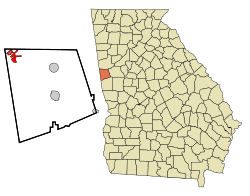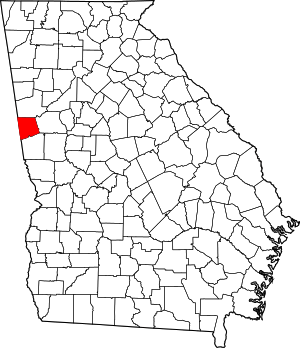Ephesus, Georgia
Ephesus is a city in Heard County, Georgia, United States. The city was founded as "Loftin", and was incorporated as "Ephesus" in 1964, after the local church and school, which had been named for the biblical city of Ephesus in present-day Turkey.[5] The population was 427 at the 2010 census.[6]
Ephesus, Georgia | |
|---|---|
Ephesus in 2012 | |
 Location in Heard County and the state of Georgia | |
| Coordinates: 33°24′18″N 85°15′35″W | |
| Country | United States |
| State | Georgia |
| County | Heard |
| Government | |
| • Mayor | Denney Rogers |
| Area | |
| • Total | 3.69 sq mi (9.57 km2) |
| • Land | 3.69 sq mi (9.57 km2) |
| • Water | 0.00 sq mi (0.00 km2) |
| Elevation | 1,234 ft (376 m) |
| Population (2010) | |
| • Total | 427 |
| • Estimate (2019)[2] | 461 |
| • Density | 124.80/sq mi (48.18/km2) |
| Time zone | UTC-5 (Eastern (EST)) |
| • Summer (DST) | UTC-4 (EDT) |
| ZIP Code | 30170 |
| Area code(s) | 706 |
| FIPS code | 13-27708[3] |
| GNIS feature ID | 0355709[4] |
Geography
Ephesus is located in the northwest corner of Heard County at 33°24′18″N 85°15′35″W (33.405084, -85.259625).[7] It is 2 miles (3 km) east of the Alabama border. Georgia State Route 100 passes through the center of town, leading north 10 miles (16 km) to Bowdon and southeast 14 miles (23 km) to Franklin, the Heard County seat. Carrollton, the nearest city with more than 20,000 people, is 17 miles (27 km) to the northeast.
According to the United States Census Bureau, Ephesus has an area of 3.0 square miles (7.8 km2), all land.[6]
Demographics
| Historical population | |||
|---|---|---|---|
| Census | Pop. | %± | |
| 1970 | 212 | — | |
| 1980 | 184 | −13.2% | |
| 1990 | 324 | 76.1% | |
| 2000 | 388 | 19.8% | |
| 2010 | 427 | 10.1% | |
| Est. 2019 | 461 | [2] | 8.0% |
| U.S. Decennial Census[8] | |||
As of the census[3] of 2000, there were 388 people, 154 households, and 111 families residing in the town. The population density was 127.9 people per square mile (49.4/km2). There were 170 housing units at an average density of 56.0 per square mile (21.7/km2). The racial makeup of the town was 98.45% White, 0.77% African American, 0.52% Native American, and 0.26% from two or more races.
There were 154 households, out of which 35.1% had children under the age of 18 living with them, 62.3% were married couples living together, 6.5% had a female householder with no husband present, and 27.3% were non-families. 26.0% of all households were made up of individuals, and 15.6% had someone living alone who was 65 years of age or older. The average household size was 2.52 and the average family size was 3.01.
In the town, the population was spread out, with 25.3% under the age of 18, 6.2% from 18 to 24, 30.9% from 25 to 44, 22.2% from 45 to 64, and 15.5% who were 65 years of age or older. The median age was 36 years. For every 100 females, there were 103.1 males. For every 100 females age 18 and over, there were 94.6 males.
The median income for a household in the town was $40,833, and the median income for a family was $44,250. Males had a median income of $30,750 versus $17,250 for females. The per capita income for the town was $19,749. About 8.2% of families and 14.0% of the population were below the poverty line, including 25.0% of those under age 18 and 10.9% of those age 65 or over.
Education
Ephesus has a small elementary school for grades Pre-K through 5.
Gallery
- Ephesus City Hall
- Ephesus Public Library
References
- "2019 U.S. Gazetteer Files". United States Census Bureau. Retrieved July 9, 2020.
- "Population and Housing Unit Estimates". United States Census Bureau. May 24, 2020. Retrieved May 27, 2020.
- "U.S. Census website". United States Census Bureau. Retrieved 2008-01-31.
- "US Board on Geographic Names". United States Geological Survey. 2007-10-25. Retrieved 2008-01-31.
- Krakow, Kenneth K. (1975). Georgia Place-Names: Their History and Origins (PDF). Macon, GA: Winship Press. p. 73. ISBN 0-915430-00-2.
- "Geographic Identifiers: 2010 Demographic Profile Data (G001): Ephesus city, Georgia". American Factfinder. U.S. Census Bureau. Retrieved May 18, 2017.
- "US Gazetteer files: 2010, 2000, and 1990". United States Census Bureau. 2011-02-12. Retrieved 2011-04-23.
- "Census of Population and Housing". Census.gov. Retrieved June 4, 2015.
